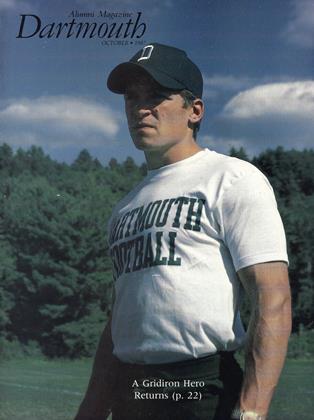This year two Dartmouth alumni are among the 32 "outstandingly talented and promising individuals" to receive Mac Arthur Fellowships. Biologist and physician Stuart A. Kauffman '61, at left, and poet Richard Kenney '70 were awarded $290,000 and $245,000 respectively. Intended to free creative individuals from economic pressures, the fellowships carry no constraints as to how the winners use their time or the money.
Like most winners, Kauffman and Kenney were taken completely unaware by the awards. "I don't know what I'll use it for, Kauffman said of the money shortly after the awards were announced. Kenney had a similar reaction to the news. "I don't know what to say. I'm pretty well dumb-struck," he commented.
A professor of biochemistry and biophysics at the School of Medicine of the University of Pennsylvania, Kauffman is working on the frontiers of evolutionary theory with his research on developmental genetics and the evolution of complex biological systems. He has shown it is not as difficult as had been thought for natural selection, working with random mutation, to give rise to adaptive and complex organisms. His research has demonstrated that complex systems are self-organizing and that there are self-replicating sets of proteins.
Kauffman is currently attempting to develop biological selection procedures to obtain specific proteins that could be used as drugs or vaccines. He employs genetic engineering techniques to generate "billions and trillions" of novel genes and proteins, which are then screened to assess their usefulness.
Kauffman graduated summa cum laude from Dartmouth with a philosophy and psychology major following a year as a senior fellow. He won a Marshall Scholarship to Oxford—"my last major prize," he says—where he got a second bachelor's degree in philosophy, psychology, and physiology. He received a medical degree at the University of California at San Francisco in 1968 and interned at Cincinnati General Hospital. By 1969 he was an assistant professor of theoretical biology at the University of Chicago. He went to the National Cancer Institute in 1969 as a Public Health Service officer and since 1975 has been at Penn.
Kenney has been drawing the attention of literary critics ever since his first volume of poetry, The Evolutionof the Flightless Bird won the prestigious Yale Series of Younger Poets competition in 1983. The Publisher'sWeekly review of that volume, published in 1984, said, "Kenney's rhythm is a kind of vehicle and the ride can be exhilarating, but that same speedy line is also chockablock with internal effects that enrich the meter, playing over and under it like the pianist's left hand. His subject is history—all of it, from prehistoric times to his own adventures in Greece . . . Kenney is ambitious and challenging, definitely a poet to watch." Kenney's MacArthur Fellowship is proof that people have been watching him and like what they see.
The son of Laurence A. Kenney '28, Kenney majored in English literature at Dartmouth. He and his wife, Mary Hedberg, have spent the last year in Rome, where he has been on a poetry fellowship from the American Academy and Institute of Arts and Letters. He is completing a third volume of poetry, The Invention of theZero. His second, Orrery, was published in 1985.
Kenney is teaching creative writing at the University of Washington in Seattle this fall. He told the SeattleTimes that receiving the MacArthur Fellowship will probably mean he will gradually spend more time on writing than teaching.
 View Full Issue
View Full Issue
More From This Issue
-
 Feature
FeatureSETTING FREE THE MARKET
October 1987 By Tyler Bridges -
 Feature
FeatureBuilding a Better Student Body
October 1987 By Thurman Zick -
 Cover Story
Cover StoryThe Buddy System
October 1987 By Frank Cicero '85 -
 Feature
FeatureWhat Price Glory?
October 1987 By Ted Leland -
 Feature
FeatureAlumni Gym Scrapbook
October 1987 By Gil Williamson -
 Feature
FeatureBad Things You Learned in Gym
October 1987 By Lee Michaelides







